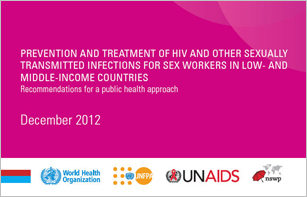
Feature Story
New guidelines to better prevent HIV in sex workers
11 December 2012
11 December 2012 11 December 2012
The World Health Organization (WHO) in partnership with UNFPA, UNAIDS, and the Global Network of Sex Work Projects, have developed new guidelines to better protect sex workers from HIV and other sexually transmitted infections (STIs).
Sex workers in many places are highly vulnerable to HIV and other sexually transmitted infections (STIs) due to multiple factors, including large numbers of sex partners, unsafe working conditions and barriers to the negotiation of consistent condom use. Moreover, sex workers often have little control over these factors because of social marginalization and criminalized work environments. Alcohol, drug use and violence in some settings may further exacerbate their vulnerability and risk.
“The risk of a sex worker becoming infected with HIV and STIs is far higher than for other people,” said Dr Gottfried Hirnschall, Director of the WHO Department of HIV/AIDS.
The objective of the guidance document, Prevention and treatment of HIV and other sexually transmitted infections for sex workers in low- and middle- income countries, is to provide technical recommendations on effective programmes for the prevention and treatment of HIV and other STIs among sex workers and their clients.
Preventing infection among sex workers has the potential to both improve the health of individual sex workers as well as to slow HIV and STI transmission among wider populations. Early actions in countries as diverse as Brazil, India, Kenya and Thailand have succeeded reducing STI transmission in sex work by increasing condom use, leading to improved health outcomes for sex workers and rapid control of HIV and STI epidemics.
The new WHO guidelines recommend that countries work towards decriminalization of sex work and urge countries to improve sex workers’ access health services. They also outline a set of actions to empower sex workers and emphasize that correct and consistent condom use can reduce transmission between female, male and transgender sex workers and their clients.
Evidence indicates that where sex workers are able to negotiate safer sex, HIV risk and vulnerability can be sharply reduced. The guidelines call for voluntary periodic screening and treatment of STIs for sex workers to both improve their health and control the spread of HIV and STIs.
According to WHO, the evidence-based guidelines are designed for use by national public health officials and managers of AIDS and STI programmes, nongovernmental organizations including community and civil society organizations, and health workers. These guidelines may also be of interest to international funding agencies, the scientific media, health policy-makers and advocates.



